Latest Posts
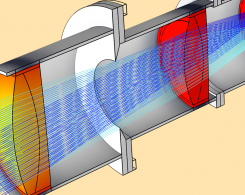
How to Create Complex Lens Geometries for Ray Optics Simulations
Learn how to set up the model geometry for a complex lens system in a way that ensures an effective and successful ray optics simulation.

Happy Birthday, Jean-Charles de Borda
Jean-Charles de Borda traveled the seas in the French military before making strides in the fields of fluid mechanics, geodesy, navigation, and more.
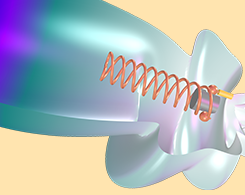
Analyzing Operating Mode Options for Helical Antennas
Simple but effective, helical antennas are used in smart implants, RFID, radio, GPS, space probes, and more. You can use RF simulation to analyze the operating mode options for these antennas.

Happy Birthday, Claude Shannon
Claude Shannon ushered in a new age of communications technology, contributing ideas about testing digital circuits, coding messages in binary, and programming artificial intelligence.

Teaching Students About Acoustics Phenomena with Apps
Acoustics concepts and their underlying theories can be difficult for engineering students to visualize. For one university, simulation applications proved to be an effective teaching tool.
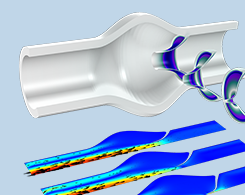
Modeling Fluid-Structure Interaction in a Heart Valve
The average human heart beats 100,000 times per day, but what if the person has cardiac issues? Modeling fluid-structure interaction in a heart valve can help researchers develop new treatments.
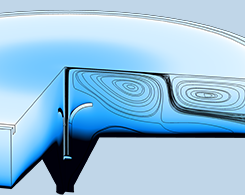
Analyzing Wastewater Contaminant Removal in a Secondary Clarifier
1 potential way to ensure sustainable water access is by developing safe and efficient wastewater clarifiers. Engineers can use fluid flow simulation to develop optimized clarifier systems.
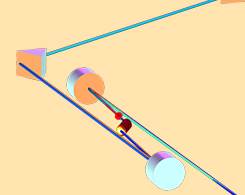
Ray Optics Simulation of Sagnac Interferometers and Ring Laser Gyros
Have you ever been in a revolving restaurant that slowly spins as you dine? This same concept can be used to understand the operating principles of Sagnac interferometers and ring laser gyros.
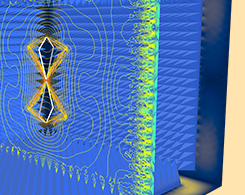
Smart(er) Healthcare: Designing RFID Tags for Biomedical Applications
Bioengineering meets RF simulation in this blog post about designing RFID systems that can be used for safe and optimized patient care.
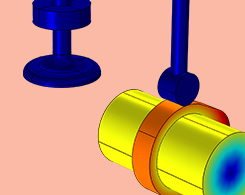
How to Model a Cam-Follower Mechanism
Watch a series of animations that show the different types of cam-follower mechanisms before learning how to model them in COMSOL Multiphysics®.

Common Pitfalls in Electrothermal Analysis
In the real world, electromagnetic heating often involves a nonlinear temperature. Learn some common pitfalls that occur during this type of electrothermal analysis and how to overcome them.
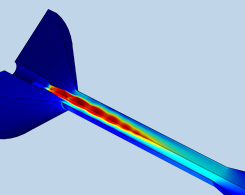
Analyzing a Supersonic Ejector with CFD Simulation
From food refrigeration in a local market to debris removal in the outer corners of space, ejectors have a wide range of uses. You can use the CFD Module to analyze a supersonic ejector design.

Happy Birthday, Leonhard Euler
His last name is pronounced “oiler” and he is considered one of the greatest mathematical scientists of all time. Learn about the life and work of Leonhard Euler.
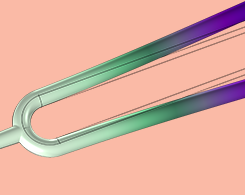
Finding Answers to the Tuning Fork Mystery with Simulation
If you strike a tuning fork and hold it against a tabletop, the peak frequency of the emitted sound doubles. Is there a physical explanation for this “tuning fork mystery”?

Multiphysics Modeling of Stress Corrosion in Underground Pipelines
Stress corrosion is a phenomenon that causes degradation in underground pipelines. Learn how to use multiphysics modeling to understand and predict its occurrence.
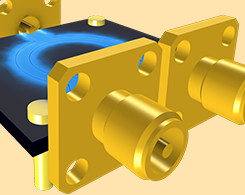
Simulating an SMA Connector on a Grounded Coplanar Waveguide
SMA connectors are used in cellphone antennas and PCB testing. To optimize their performance for a specific use, electrical engineers can evaluate their designs with simulation.
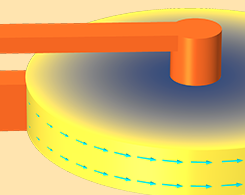
Redesigning Faraday’s Wheel: Creating Efficient Homopolar Generators
Acyclic generator, unipolar generator, disc dynamo, Faraday wheel, homopolar generator: Whatever you call it, this device has an interesting history and a variety of applications.

How to Model Linear and Nonlinear Optics in the COMSOL® Software
See how to model the Kerr effect, and other linear and nonlinear optical phenomena, using the Wave Optics Module and COMSOL Multiphysics®.
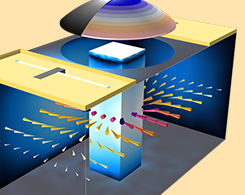
High-Fidelity Modeling of a Tunable Filter via Multiphysics Simulation
Tunable cavity filters can enhance the development of high-speed, wireless communication networks. To optimize these devices for such a purpose, we can turn to high-fidelity modeling.

How to Perform Multimaterial Optimization in COMSOL Multiphysics®
Does a tuning fork sound better when made out of aluminum instead of copper or steel? In COMSOL Multiphysics®, you can perform an optimization study for multiple materials to find out.

How to Use the Parameter Estimation Study Step for Inverse Modeling
This blog post includes a tutorial video. Watch it to learn the steps for performing a parameter estimation study for inverse modeling in COMSOL Multiphysics®.

Coastal Erosion Uncovers Buried Tracks from Throughout History
In 2018, a series of winter storms caused severe erosion along a U.S. coastline, uncovering footprints and horse-and-buggy tracks from centuries earlier.
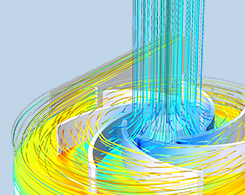
Using the Algebraic Multigrid (AMG) Method for Large CFD Simulations
There’s an ideal method for solving large CFD simulations that involve complex geometries. It’s called the algebraic multigrid (AMG) method, and you can learn all about it here.

Happy Birthday, Pierre-Simon Laplace
Pierre-Simon Laplace contributed to celestial mechanics and helped develop an equation for pressure across a curved surface. He also had his demons. The Laplace demon thought experiment, that is.
